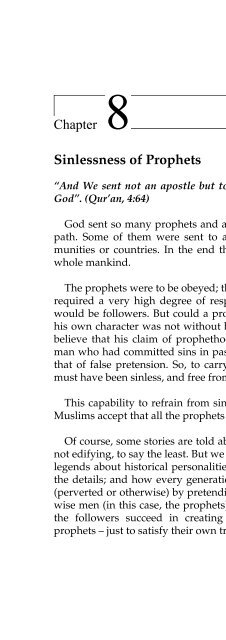Create successful ePaper yourself
Turn your PDF publications into a flip-book with our unique Google optimized e-Paper software.
Chapter 8Sinlessness of Prophets“And We sent not an apostle but to be obeyed according to the will ofGod”. (Qur’an, 4:64)God sent so many prophets and apostles to lead their people on rightpath. Some of them were sent to a small group; others to large <strong>com</strong>munitiesor countries. In the end the Prophet of Islam was sent to thewhole mankind.The prophets were to be obeyed; their examples were to be followed. Itrequired a very high degree of respect and prestige in the eyes of thewould be followers. But could a prophet <strong>com</strong>mand a genuine respect ifhis own character was not without blemish? How could his <strong>com</strong>munitybelieve that his claim of prophethood was based on truth? After all, aman who had <strong>com</strong>mitted sins in past, could again <strong>com</strong>mit another sin –that of false pretension. So, to carry on the work of God, the prophetsmust have been sinless, and free from mistakes.This capability to refrain from sins is called ‘Ismat’ in Islam. And theMuslims accept that all the prophets were sinless.Of course, some stories are told about some of the prophets which arenot edifying, to say the least. But we know how the passage of time startslegends about historical personalities; and how human mind works outthe details; and how every generation wants to justify its own morality(perverted or otherwise) by pretending that it is what was done by morewise men (in this case, the prophets). As a result of this mental exercise,the followers succeed in creating a not-very-lovely picture of theirprophets – just to satisfy their own troubled conscience.16





